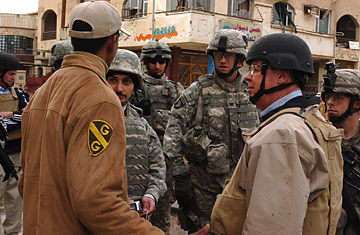
U.S. Senator Johnny Isakson from Georgia talks with U.S. soldiers in a Ghazaliyah market.
Isakson represents the state of Georgia, where most of America's troops are trained before being deployed to Iraq and Afghanistan. As a member of the Foreign Relations Committee and the Veterans' Affairs Committee, Isakson has visited Iraq every year since the 2003 invasion and supports Gen. Petraeus' surge strategy.
On the political viability of the war
The mood in Congress has changed a great deal, as is always the case when our sons and daughters are deployed in harm's way. The only thing for certain about combat and conflict is the uncertainty of that process. We certainly went through a difficult time after Baghdad fell, or particularly I guess after Saddam Hussein was captured, when the insurgency rose and the violence rose and, in fact, we lost some control for a period of time.
On the surge
Then last year was a critical year. We had the debates just before Memorial Day. In fact we had 41 debates in the Senate over the course of the year on amendments to withdraw our troops, come home and, in the words of some, "declare defeat." But those were defeated, often times very close, sometimes substantially. The surge was finally approved. The supplemental appropriation to fund it was approved. By July, we had the additional 30,000 troops in place. And the counter-insurgency plan — that General Petraeus, who had then been put in charge of all of our forces, had written — began to work. We had a dramatic decrease in casualties, a dramatic increase in stability, and that has been sustained into this year.
To measure the mood: The mood was high when we went into Baghdad, even higher when we captured Hussein. It fell precipitously during the time in which the insurgency rose. And then, after the great debate on whether to stay and do the job and implement Petraeus' plan, or come home, when the surge won, we in fact have won.
On the calls for troop withdrawal
Although there were Republicans, and most all of the Democrats who wanted [troops] to come home, I think there was a frustration with the level of violence and the casualties. Anytime your sons and daughters are giving the ultimate sacrifice, that raises a great frustration. But I think there's also a sense of purpose that the global war on terror — that this is a battle in that war — and we knew it wasn't always going to be easy. And if we decided to quit, then we would, in effect, be giving terrorism a victory.
On Iraq's future
It's really pretty much in the hands of the Iraqi parliament. As long as we can maintain — which we have demonstrated we could — the level of security that exists. What they did in February — on the de-baathification law, on establishing the provincial elections, on reconciliation — are major steps forward. And if they can complete the job on the hydro-carbon law, I think we have a chance to gradually withdraw, turn over the security to the Iraqi troops, of which we now have 500,000 trained and in uniform. Then we will have accomplished the goal of a fledgling democracy in the Middle East.
